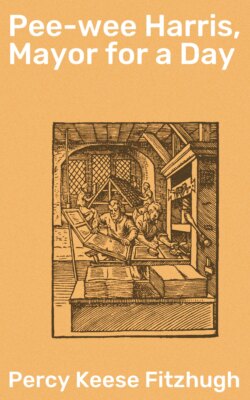Читать книгу Pee-wee Harris, Mayor for a Day - Percy Keese Fitzhugh - Страница 13
На сайте Литреса книга снята с продажи.
CHAPTER XI
THE TRAIL
ОглавлениеTable of Contents
It is to Pee-wee’s credit that, convinced though he was, he did not go at once to the little house of the Liventi boys. He walked past it, but he did not go in. He was glad not to have seen either of the brothers while he was near their home.
The three little houses huddling together in a close row seemed more than ever like outcasts on the fashionable Terrace Avenue. It seemed likely enough that Bulton was right about this ugly, little, out-of-date trio being doomed. One porch ran across the three little houses and this was made into three porches by little separating fences, long unpainted and falling to pieces. A woman was shaking a rug out of an upper window of the end house as Pee-wee passed.
The middle house, which was the Liventi house, was without curtains, nor was there even a sociable bench or chair upon the wretched little porch. Pee-wee wondered in what distant town or city the gracious and bespangled tenants of this poor abode were playing and bowing and smiling to applauding audiences. He went by very quietly and hurriedly, for he did not want to be hailed.
Why? Had he not a message to deliver in that house? Well, he told himself, they might not be home....
After supper he realized that only about half an hour remained before Bulton’s coming—before the promised squeak of the new chipmunk. Yet still Pee-wee pushed the mower around the front lawn (entirely unnecessary) before strolling up to the end of the block. Then he went.
All was quiet around the three little houses. Pee-wee allowed himself some comfort from the doubtful information that this unsightly little block was soon to be razed and that those roving strangers, the Liventi family, would be gone, no one knew where. Yet the enthusiastic gesticulations and ready compliance of the little actor man who talked broken English kept intruding into his mind. Well, anyway, he had done a foolish thing to make such a bargain with these strange boys, and now he was going to undo it.
He was going to start big, with a hundred dollars....
He went up to the steps on tiptoe, he did not know why. But he did not pull the old-fashioned bell handle. From somewhere in the house he could hear music. He paused, listening. It was the marimba that he heard and the air was a familiar one to Pee-wee. It was a popular piece that he had more than once heard over the radio. The Old Lake Trail, it was called. It was a spirited piece and was being played with all those running variations that characterized the Liventi method. Now and then the players paused, repeating a part, as if practicing. The Old Lake Trail, Pee-wee knew it well.
The word trail was always in Pee-wee’s mind and he had used it much in his talk with these brothers. But the truth did not occur to him, which was that Tasca and Bruno had selected this piece as having at least a remote connection with scouting. It was about a trail. And they played it in march time to give an impression of hikers upon a lonely trail. They were going to surprise Pee-wee and every one by playing it as an encore, in the event of their winning applause. And they played it so that the messenger without could hardly keep his feet still.
But he had his duty to perform and he pulled the bell. Tasca opened the door, holding one of the marimba hammers. Pee-wee walked into the tiny, musty hall and to the poor little living-room where the old Italian grandmother in her motley shawl was so intent upon her sewing (and so removed from America’s young life perhaps) that she only nodded at him. Then Bruno came through from the back room, his hair all disheveled from his musical acrobatics.
“H’lo,” said Pee-wee.
“Did you hear it?” Bruno asked.
“Yes, but there’s something I got to see you about,” Pee-wee said.
Did Tasca and Bruno sense something wrong? Those whose hopes run high are apt to sense trouble and anticipate bad news. How could Pee-wee (rough woodsman and all that) know how high their hopes had run? The old woman, who knew not a word of English, caught the agitation of her grandsons and watched Pee-wee shrewdly.
“Is—isn’t there going to be any show?” Tasca ventured.
Pee-wee paused. And before he found words to answer, he found himself—the real Pee-wee Harris. That was better than finding a hundred dollars. For of all the scout claptrap that money will buy, tents and archery sets and so on, Pee-wee Harris himself was the greatest piece of scout paraphernalia known to scouting. You could stagger him with a hundred dollars, but you could not buy him with it. You see how it was, he started after a hundred dollars and he stumbled into The Old Lake Trail. Pee-wee was again on the right trail.
“Didn’t I say there was going to be one?” he demanded. “If I say a thing I mean it. You got to be ready by five o’clock Saturday afternoon. We’re going to hike up through the woods to Little Valley and we’re going to cook our supper in the woods and go by scout resources and things and maybe even we’ll get all smutched up eating roasted potatoes and that’ll show the audience we’re real scouts and don’t have to eat home or buy our suppers. So you fellers have got to be ready at five o’clock sure. Because maybe we’ll stop in Bennett’s and get ice cream cones before we start.”
There was the real Pee-wee Harris for you!
